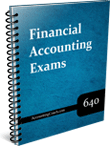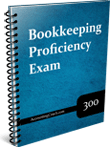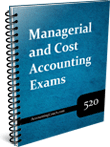

Welcome to issue 4 of The Student Accountant, the official E-newsletter of
Accounting-Basics-For-Students.com!
In this issue:1. Why You Shouldn’t Memorize Debits & Credits2. Free Accounting Questions – Test Yourself! 3. A Simple Dictionary of Accounting Terms 4. Free eBook!

1. Why You Shouldn’t Memorize Debits & CreditsI remember it clearly. The pain. The exasperation. The exhaustion. Drumming mindless journal entry account names into my head for hours on end.Memorizing double entries seems to be the main way students learn debits and credits. But is this really necessary? After studying accounting myself and teaching it to hundreds and thousands of others, I came to this conclusion: it’s not. How did I come to that conclusion? Well, early on when I was studying the subject I started to see how the whole subject is actually totally logical, all based on the accounting equation and its elements. If you understand the accounting equation and its 3 elements (assets, liabilities and equity), as well as how income and expenses (the other 2 elements) ties into equity, then you can also understand why you debit and credit any type of account. Did you know that every single debit or credit account falls under each of the 5 elements (categories) I just described? Did you know that each of the 5 elements above are all debited and credited according to which side of the accounting equation they fall on? Did you know that “debit” just means “left side” and “credit” just means “right?” Well, if you didn’t, you’re not alone, but that means it’s time to get started with the very first lesson on Accounting Basics for Students and work your way through the lessons, one by one. It is not just possible, but also easy, to know accounting well and to excel in the subject. This is not done by memorizing (memorizing is only really needed on the odd occasion to remember a few accounts that have complicated names). So why shouldn’t you memorize debits and credits? Because 95% of the time it’s totally unnecessary. Because it’ll give you headaches. Because memorizing journal entries takes many, many hours over the course of your studies, time which can easily be saved by just making sure you fully understand the accounting equation and debits and credits in the first place. All you need to do is make sure you understand the subject. And that starts with the basis of it all –
the accounting equation.
Don’t be a parrot – instead learn and understand why you debit one account and credit another, starting with the first lesson on the site. Good luck!

2. Free Accounting Questions – Test Yourself!Think you’re clever? Think you know accounting? Test yourself by answering the accounting questions below, questions posed by fellow students on the Accounting-Basics-For-Students.com website. Here are the latest and greatest questions that have been submitted for you to answer: 
3. A Simple Dictionary of Accounting TermsThere is an accounting dictionary. It’s simple and easy to use and defines hundreds of terms you will encounter in your studies.
And it’s available here on Accounting Basics for Students.
Do you know what happens when you don’t really understand a term like any of the ones mentioned above? What happens is that you never fully get the concept you're learning at all, and at the end of the day you usually have to either resort to memorizing or you have to reread something a number of times (like banging your head into a wall) or you flunk that section of your accounting studies. Oh man, what a pain! That’s why I created the dictionary – so accounting makes a lot more sense and is a lot easier. Fewer headaches. With an accounting dictionary, you just look up the strange accounting words you read – and, because it's explained simply – you get it. No banging your head against a wall or tearing your hair out to try and get what the textbook says. You just understand it. Plain and simple. 
4. Free eBook!Last year we created a whole section on the site just to hear what you have to say – called Your Voice. In this section you can create your own Personal Web Page, post funny, crazy or horrifying Accounting or Student Stories, find or submit details of Accounting Tutors and more. We really wanna hear what you have to say. We wanna hear what you have to say so badly that if you submit a qualifying entry to any of the three pages above, we’ll send you the official Accounting Basics for Students eBook, valued at $25, for free! ~ The Editor New! CommentsHave your say about what you just read! Leave me a comment in the box below. |
Search this site:
All the lessons on this site, plus much, much more...
The official Accounting Basics for Students e-book
Subscribe to
The Student Accountant newsletter





